Three-time attorney general Sharifuddin Pirzada passes away
Pirzada had made history by becoming Pakistan’s youngest attorney general
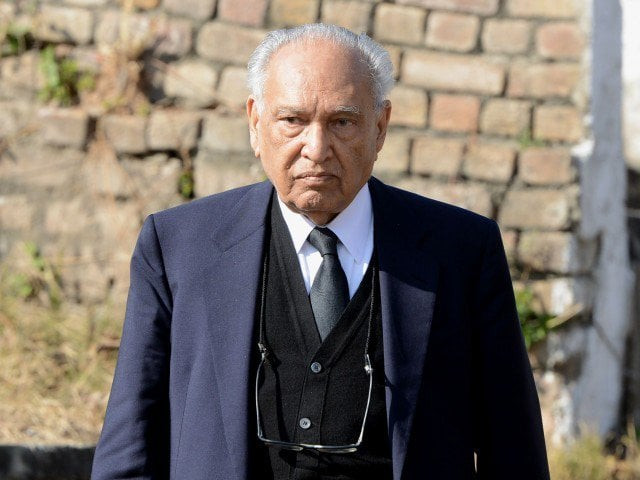
Sharifuddin Pirzada is believed to have assisted Quaid-e-Azam Muhammad Ali Jinnah as his private secretary but others say he assisted Khurshid Hassan Khurshid, the private secretary of the nation’s founder. PHOTO: AFP
One of the most controversial lawyers in the country and throughout Pakistan’s history, Pirzada had helped successive military regimes gain legitimacy.
His colleagues say he played an active role in the independence movement in the Subcontinent. But his loyalties as a constitutional expert, however, remained with the military dictators who frequently suppressed democracy and fundamental rights in the country.
Awarded the Nishan-e-Imtiaz in 1998, Pirzada is believed to have assisted Quaid-e-Azam Muhammad Ali Jinnah as his private secretary but others say he assisted Khurshid Hassan Khurshid, the private secretary of the nation’s founder.
Pakistan's Devil's Advocate says he's just doing his job
Pirzada was born on June 23, 1923 in Burhanpur, India and was a direct descendant of Shaikh Burhanuddin Raz-e-Ilahi of the Shattar order in Burhanpur. Shaikh Burhanuddin's disciples, among others, included Mughal Emperor Aurangzeb.
Pirzada graduated from the University of Bombay in 1945 and obtained his Barrister-at-Law degree from Lincoln’s Inn in the United Kingdom. He started his career as law professional in Bombay and later settled in Karachi.
According to Abrar Hasan, a senior lawyer, Pirzada earned fame during the hearing of the important case of Moulvi Tamizuddin Khan on the dissolution of a constituent assembly by Ghulam Muhammad. He was assisting then senior jurist II Chundrigarh.
This was the first time the Pakistani courts echoed with the "Doctrine of Necessity". Pirzada’s specialty, however, was civil litigation.
During military dictator Ayub Khan’s regime he was appointed the attorney general of Pakistan.
Critics believe this was the time he entered the army’s general headquarters.
Musharraf’s treason case: Prosecution pours scorn on Sharifuddin Pirzada
At the time, every military regime that came into power by overthrowing democratically elected governments benefited from Pirzada’s legal expertise. He served a litany of dictators, from General Ziaul Haq to General (retd) Pervez Musharraf.
Career in the government
Throughout his career, Pirzada served on a variety of senior government posts.
Until March 2008, he served as an honorary senior adviser to the prime minister on foreign affairs, law, justice and human rights with the status of senior federal minister.
He had the honour of being the youngest ever person to be appointed as the attorney general of Pakistan, a post on which he served from 1965 to 1966.
The same year he was appointed the foreign minister, which he remained from 1966 to 1968.
In 1966, he represented Pakistan in the Commonwealth Head of Government Conference and in 1967 he moved the Resolution 2,253 of the United Nations General Assembly on the status of Jerusalem.
Again in 1968 he was appointed as the attorney general of Pakistan and served on this key post till 1971.
He represented the country in the Commonwealth Law Ministers and Attorney Generals Conference, 1971 and was appointed president of the Afro-Asian Legal Consultative Committee in 1969. Pirzada again served as the country’s attorney general from 1977 to 1985.
In 1979, he was appointed minister for law and parliamentary affairs and served on the post till 1985. Then, in 1993, he was appointed caretaker foreign minister.
Fatima Jinnah and Sharifuddin Pirzada
He remained an honorary senior adviser to the chief executive and member (ex-officio) of the National Security Council of Pakistan from 1999 to 2008.
Pirzada also served as an honorary senior adviser to the chief executive on foreign affairs, law, justice and human rights with the status of senior federal minister from 2002 to 2008.
OIC
Pirzada served as the chairperson of the experts’ group for drafting the status of the Islamic International Court of Justice.
In 1985, he was unanimously elected as secretary-general of the Organisation of Islamic Cooperation and served on that post till 1988.
According to some experts, this is the highest post at an international organisation on which any Pakistani has ever served. In 2007, he became a member of the committee of eminent jurists to review the OIC Charter.
Pirzada also represented the country in international courts, including in the Rann of Kutch case of 1965. He was engaged as counsel in the reference regarding Namibia before the International Court of Justice in 1970 and pleaded Pakistan’s case against India in the overflights case at the International Civil Aviation Organisation in 1971.
Association with the UN
Pirzada served as a member of the United Nations Sub-Commission on Prevention of Discrimination and Protection of Minorities between 1972 and 1979. Later, he was made the sub-commission’s chairperson from 1977 to 1978.
Art of killing without a trace
He also remained the chairperson of the Investigation and Working Group on complaints of the UN Sub-Commission on Prevention of Discrimination and Protection of Minorities between 1978 and 1979.
In 1995, he was made a leader of the Pakistani delegation to the UN Human Rights Commission.
Publications
Pirzada authored at least 10 books - Pakistan at a Glance in 1941, Jinnah on Pakistan in 1943, Leaders’ Correspondence with Jinnah, Evolution of Pakistan in 1962 (also published in Urdu and Arabic), Fundamental Rights and Constitutional Remedies in Pakistan in 1966, The Pakistan Resolution and The Historic Lahore Session in 1970, Foundation of Pakistan in 1971, Some Aspects of Quaid-e-Azam’s Life in 1978, Collected Works of Quaid-e-Azam Jinnah and the Dissolution of Constituent Assembly of Pakistan in 1985.

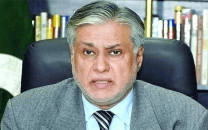

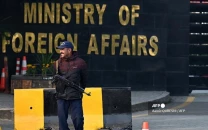

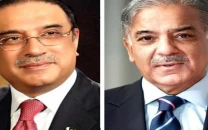
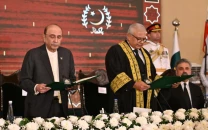












COMMENTS
Comments are moderated and generally will be posted if they are on-topic and not abusive.
For more information, please see our Comments FAQ